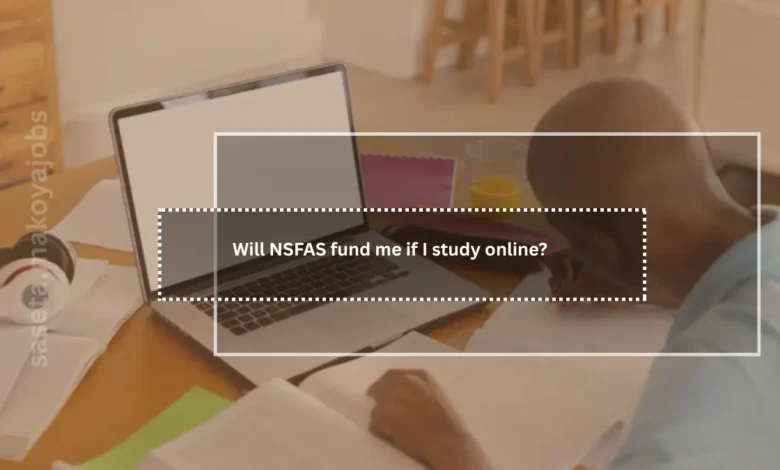Will NSFAS fund me if I study online?

Will NSFAS fund your online studies? Find out if you’re eligible for funding when studying remotely at a public institution in South Africa.
Will NSFAS Fund My Online Studies? What South African Students Should Know
The rise of digital learning has made online and distance education increasingly accessible—and many students are asking: Does NSFAS fund online studies in South Africa?
This guide explains everything you need to know, including eligibility, what NSFAS covers, its limitations, and how to plan for online learning with financial aid.
What Is NSFAS?
The National Student Financial Aid Scheme (NSFAS) is a South African government bursary initiative that funds eligible students to study at public universities or TVET colleges. It covers tuition fees, registration, and student allowances depending on the mode and level of study.
Does NSFAS Fund Online or Distance Learning?
✅ Yes—If It’s at a Public Institution and Full-Time
NSFAS does fund online or distance learning programs if:
- The qualification is offered by a public university or TVET college.
- You’re studying toward a first undergraduate qualification registered on the National Qualifications Framework (NQF).
A prime example is UNISA (University of South Africa), a distance-learning institution where NSFAS funding is fully applicable.
💻 Blended Learning Is Also Funded
Blended learning (a mix of online and in-person study) is also eligible if:
- The course is full-time, accredited, and NQF-aligned.
- The institution is a public higher education provider.
❌ What NSFAS Does Not Fund
- Short courses
- Private colleges or universities
- Part-time studies
- Postgraduate degrees (with a few exceptions like PGCE and Nursing)
This means if you’re planning to study at a private online academy or take a short certificate course, NSFAS will not cover your costs.
NSFAS Funding Structure for Online Students
While online learners are funded, the type of support differs from contact students.
📘 What’s Covered:
- Tuition fees (in full)
- Registration fees
- Learning materials allowance (approx. R5,460 per year)
- Personal care allowance (approx. R3,045 per year)
- Laptop allowance (if applicable and approved)
🚫 What’s Not Covered:
- Accommodation allowance
- Transport allowance
- Meal allowance
Since online learners are typically studying from home, NSFAS does not offer living costs or transport-related support for distance learners.
Who Qualifies for NSFAS When Studying Online?
To qualify for funding while studying online, you must:
- Be a South African citizen with a valid ID.
- Have a household income below R350,000/year (R600,000 for students with disabilities).
- Be registered for a full-time, accredited undergraduate program.
- Be attending a public university or TVET college.
- Meet the academic progress criteria, such as passing modules and maintaining satisfactory academic results.
SASSA grant recipients automatically qualify for NSFAS.
Real-World Example: UNISA Students
UNISA is a leading public institution offering distance education. NSFAS provides eligible UNISA students with:
- Tuition and registration coverage
- Learning material allowance
- Laptop support (if approved)
- Personal care allowance
However, accommodation and meals are not included because students study remotely.
Important Notes for Online NSFAS Students
✅ Make Sure Your Course Qualifies
Only full-time undergraduate qualifications at public institutions are covered. Always confirm that your course is NSFAS-approved.
✅ Use NSFAS Funds Responsibly
Since online learners receive fewer allowances, budgeting becomes crucial. Use learning material and personal allowances wisely.
✅ Maintain Academic Performance
Failing too many modules or not meeting performance standards can lead to suspension of funding.
✅ Understand Application Deadlines
Apply early via the NSFAS online portal. Deadlines are strict, and missing them could cost you a full year of funding.
Summary: NSFAS & Online Learning at a Glance
| Topic | NSFAS Coverage |
|---|---|
| Tuition Fees | ✅ Fully Covered |
| Registration Fees | ✅ Fully Covered |
| Laptop Allowance | ✅ May Be Provided |
| Learning Materials Allowance | ✅ Up to R5,460/year |
| Personal Care Allowance | ✅ R3,045/year |
| Accommodation, Meals, Transport | ❌ Not Covered for Online Students |
| Short Courses or Private Colleges | ❌ Not Funded |
| Postgraduate Degrees | ❌ Generally Not Funded |
| Institution Type Required | ✅ Public University or TVET Only |
| Study Mode | ✅ Full-Time Online or Blended Learning |
Can I Get NSFAS for a Private Online Course?
No. NSFAS does not fund any courses at private institutions, regardless of whether they are online or in-person. Even popular short-term platforms like Udemy, Coursera, or local private colleges are not eligible.
Are TVET College Online Programs Funded?
Yes—if:
- The program is full-time.
- Offered by a public TVET college.
- Registered on the NQF.
- You meet the financial and academic eligibility requirements.
Final Tips for Online NSFAS Applicants
- Choose an accredited, NQF-approved program at a public institution.
- Check your eligibility before applying and gather the necessary documents.
- Track your application via the NSFAS portal once submitted.
- Maintain good academic standing to retain funding year after year.
Conclusion
NSFAS does fund online and distance learning—but only under strict conditions. You must be enrolled full-time in a qualifying undergraduate program at a public institution such as UNISA or a public TVET college. While you won’t receive allowances for meals or accommodation, tuition and learning support are fully covered, ensuring access to education regardless of your learning format.
If you’re considering online education due to flexibility, location, or work commitments, NSFAS can still be your pathway to affordable, quality higher education—as long as you meet the requirements.





